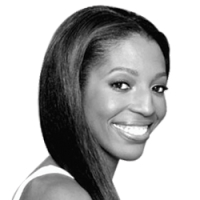In the novel Charlotte Walsh Likes to Win, a female politician advises a female Senate candidate to, “Only let the world see half of your ambition. Half [of the world] can’t handle seeing it at all.”
Recent criticisms of Sen. Kamala Harris, by the president and others, have highlighted the unique consequences female candidates, particularly those of color, face in the real world for being seen as too assertive or ambitious. So has coverage of CBS This Morning co-hosts Gayle King and Norah O’Donnell, suggesting the two secretly hate each other, and that King, the network’s brightest star, might be “too expensive.” (Hmm. Remind me how much the network paid over the years to settle various sexual harassment claims?) Some reported that O’Donnell is seen as difficult, after actively campaigning to become host of CBS Evening News, a job held by—gasp!—a man.
I believe in full equality for women and that means we should be treated as valid targets for criticism. By that standard, how many men throughout history have run hard for office or actively lobbied for a job without being called difficult for doing so?
From Hillary Clinton, to female executives, there’s been quite a bit of coverage of the penalty women suffer in the workplace and society at large for not being perceived as likable enough. A 2014 study of how this penalty impacts the performance reviews of women in tech, resulting in them being labelled “abrasive” more than men, illustrates just how likability and ambition often collide. One review of a female worker read, “Your peers sometimes feel that you don’t leave them enough room. Sometimes you need to step back to let others shine.”
A 2017 Harvard Business Review Study dug deeper and found that while men talk openly about the competitive nature of advancing in the workplace, and the importance of playing politics, women tend to shy away from doing so. The study also found that an overwhelming majority of men and women believed women are judged more harshly for being seen as playing corporate politics. One hypothesis floated is that women know they face a penalty for being seen as competitive so they don’t give voice to the idea that they may be.
So while everyone knows playing politics is essential to advancing in just about any field, women are still walking a tightrope: If we want to get anywhere, we have to be ambitious enough to want to get there, but strategic enough so that a man either doesn’t know we want to get there, or doesn’t feel threatened by our desire to go somewhere he may not have the talent or tenacity to go himself.
Obviously that presents a challenge if you’re running for office, since you have to announce your ambition to the world – specifically the ambition to be more powerful than most men. For black women candidates such ambition comes with additional baggage.
Though black women have been a significant part of America’s labor force longer than other women (from slavery, to household domestic workers after slavery), and while black women head households, our community is facing its own growing pains when it comes to women, power and ambition.
I was not the only black woman jarred by the fact that when faced with a female presidential candidate, black men voted for Donald Trump in higher numbers than they voted for Mitt Romney or John McCain. But also notable is the fact that black men voted for Republican Brian Kemp for governor in the double digits, enough to cost Stacey Abrams, who would have become the nation’s first African-American female governor, one of the closest races of the midterm election cycle. Strikingly, in the same election cycle while Andrew Gillum lost in his bid to become the first African-American Governor of Florida, he was actually boosted significantly by strong black male voter support, much like President Barack Obama.
Some pundits are already claiming that Harris, the only black woman presidential candidate so far, has a “black man problem.” They cite her record on criminal justice issues as being a potential stumbling block. But the truth is, if the same black male voters are willing to support Joe Biden, or previously supported Bill Clinton, despite their less than progressive records on criminal justice issues, then Harris doesn’t really have a black man problem, but an ambition problem.
There are black men, who like some white men and some women, have no problem with a woman raising their kids or running their households, but do have a problem with her actively pursuing more power than they have.
The only way we change that is twofold: put more women in power so that our country gets comfortable with the idea of ambitious, powerful women. One of my favorite anecdotes about the power of changing how we see power, is that after Iceland’s first female president, Vigdis Finnbogadóttir, had served for several years boys began asking if there could be male presidents.
Which leads me to the second way we change things. Parents can teach their girls that being ambitious is actually a good thing. Raising your hand in class when you know the answer is a good thing. Racing to win is a good thing, and so is winning the race. And parents can teach their boys that ambition is not a gender-specific quality. Neither is being a winner or a boss or a president, and seeing a girl or woman in any of those roles is a good thing.






